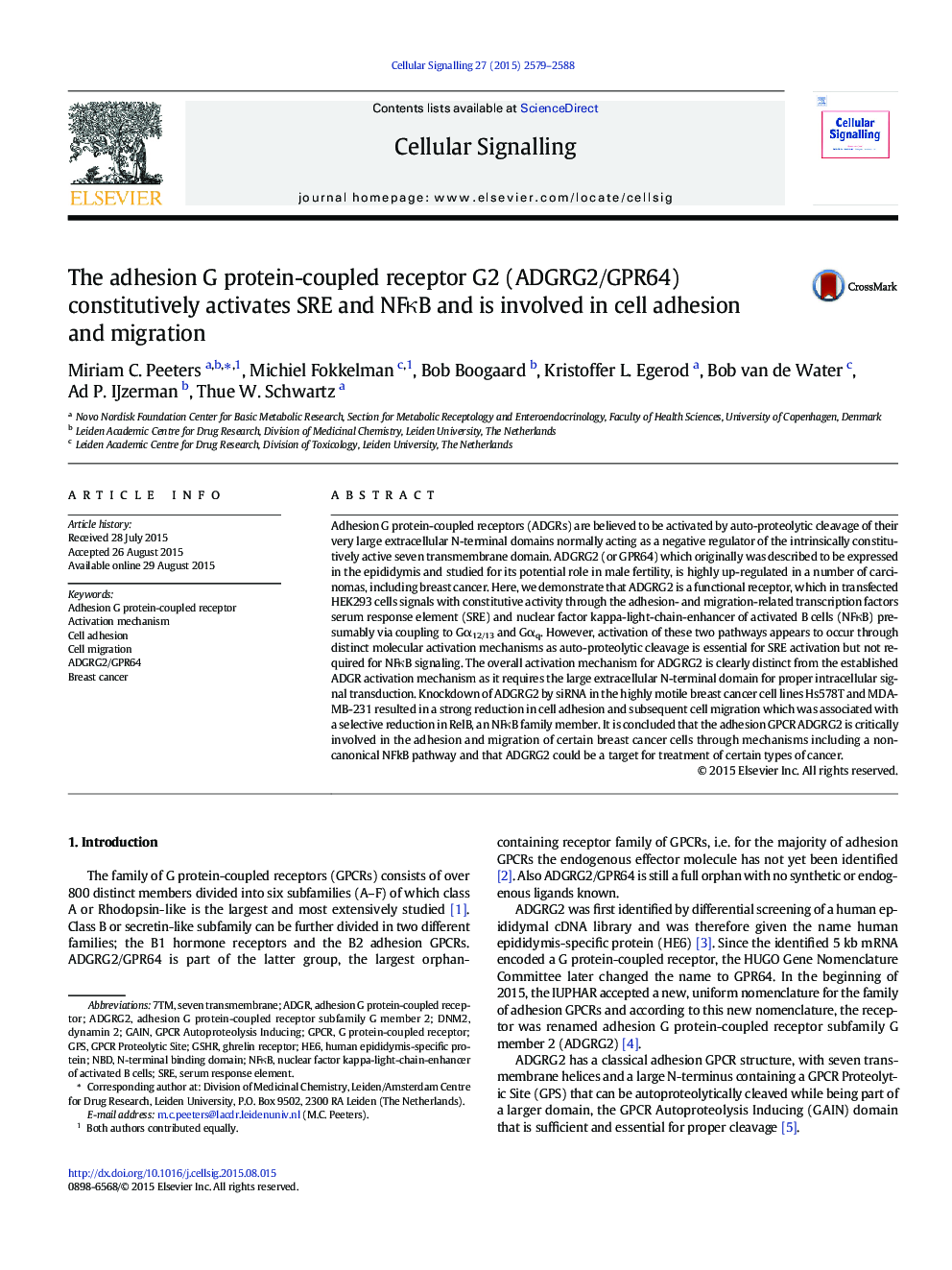| کد مقاله | کد نشریه | سال انتشار | مقاله انگلیسی | نسخه تمام متن |
|---|---|---|---|---|
| 10814817 | 1058407 | 2015 | 10 صفحه PDF | دانلود رایگان |
عنوان انگلیسی مقاله ISI
The adhesion G protein-coupled receptor G2 (ADGRG2/GPR64) constitutively activates SRE and NFκB and is involved in cell adhesion and migration
دانلود مقاله + سفارش ترجمه
دانلود مقاله ISI انگلیسی
رایگان برای ایرانیان
کلمات کلیدی
GPCR7TMGSHrSRENBDDNM2NFκB - NFKBDynamin 2 - دینین 2GPS - سامانه موقعیتیاب جهانیBreast cancer - سرطان پستانSerum response element - عنصر پاسخ سرمnuclear factor kappa-light-chain-enhancer of activated B cells - فاکتور هسته ای kappa-light-chain-enhancer از سلول های B فعال شده استCell migration - مهاجرت سلولیActivation mechanism - مکانیسم فعال سازیseven transmembrane - هفت ترامبنرCell adhesion - چسبندگی سلولیGain - کسب کردنGhrelin receptor - گیرنده گرلینG protein-coupled receptor - گیرندههای جفتشونده با پروتئین جی
موضوعات مرتبط
علوم زیستی و بیوفناوری
بیوشیمی، ژنتیک و زیست شناسی مولکولی
زیست شیمی
پیش نمایش صفحه اول مقاله

چکیده انگلیسی
Adhesion G protein-coupled receptors (ADGRs) are believed to be activated by auto-proteolytic cleavage of their very large extracellular N-terminal domains normally acting as a negative regulator of the intrinsically constitutively active seven transmembrane domain. ADGRG2 (or GPR64) which originally was described to be expressed in the epididymis and studied for its potential role in male fertility, is highly up-regulated in a number of carcinomas, including breast cancer. Here, we demonstrate that ADGRG2 is a functional receptor, which in transfected HEK293 cells signals with constitutive activity through the adhesion- and migration-related transcription factors serum response element (SRE) and nuclear factor kappa-light-chain-enhancer of activated B cells (NFκB) presumably via coupling to Gα12/13 and Gαq. However, activation of these two pathways appears to occur through distinct molecular activation mechanisms as auto-proteolytic cleavage is essential for SRE activation but not required for NFκB signaling. The overall activation mechanism for ADGRG2 is clearly distinct from the established ADGR activation mechanism as it requires the large extracellular N-terminal domain for proper intracellular signal transduction. Knockdown of ADGRG2 by siRNA in the highly motile breast cancer cell lines Hs578T and MDA-MB-231 resulted in a strong reduction in cell adhesion and subsequent cell migration which was associated with a selective reduction in RelB, an NFκB family member. It is concluded that the adhesion GPCR ADGRG2 is critically involved in the adhesion and migration of certain breast cancer cells through mechanisms including a non-canonical NFkB pathway and that ADGRG2 could be a target for treatment of certain types of cancer.
ناشر
Database: Elsevier - ScienceDirect (ساینس دایرکت)
Journal: Cellular Signalling - Volume 27, Issue 12, December 2015, Pages 2579-2588
Journal: Cellular Signalling - Volume 27, Issue 12, December 2015, Pages 2579-2588
نویسندگان
Miriam C. Peeters, Michiel Fokkelman, Bob Boogaard, Kristoffer L. Egerod, Bob van de Water, Ad P. IJzerman, Thue W. Schwartz,